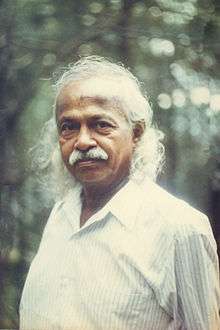Sugathapala de Silva
| Sugathapala De Silva | |
|---|---|
 | |
| Born |
Avalikkara Gallappattige Sugathapala De Silva 4 August 1928 Midigama (Weligama, Matara), Sri Lanka |
| Died |
28 October 2002 (aged 74) Colombo, Sri Lanka |
| Nationality | Sri Lankan |
| Other names |
Lovable Dictator ( Sonduru Aknyadayakaya) |
| Education |
Ananda College Thurstan College |
| Spouse(s) | Sheela De Silva |
| Children | Dimuthu Prasada Gallappatti , Vanamali Kaushalya Gallappatti , Sudesh Prabudda Gallappatti , Harindra Pragathi Gallappatti |
Sugathapala De Silva (4 August 1928 – 28 October 2002) was an acclaimed Sri Lankan dramatist and novelist, translator, radio play producer, and Sinhala Radio Play writer.[1]
Biography
Early life
Sugathapala De Silva was born on 4 August 1928 Midigama (weligama, Matara), downsouth town 130 kilometres from Colombo to the son of a small trader.[2] He grew up there, among Sinhala, Tamil and Muslim traders. His childhood experiences would later influence him to write the novels Ikbithi Siyalloma Sathutin Jeevathvuha and Esewenam Minisune Me Asaw. According to other writing he was born in Weligama and After studied in a few schools in Galle and from tenth grade studied Jinaraja College, Gampola, and came to Colombo.[3] Sugathapala de Silva worked as a salesman at K.V.G. de Silva's bookstall at Wellawatte. . He made this environment read book using free time. That habit amassed in him to gain knowledge which becomes a free thinker, a creator, an innovator, a radical and non-conformist.[4]
1960
De Silva came to Colombo, Sri Lanka in the 1960s, and became engaged in the political and cultural movement, taking place there at that time. Nicknamed the "lovable dictator", he formed the drama group "Apey Kattiya" there, and started to translate and adapt plays by Tennessee Williams and Pirandello, like Cat on a Hot Tin Roof and Six Characters in Search of an Author, to wide acclaim. He followed these plays with original ones, like Thattu Geval and Boarding Karayo which captured the mood of the new city-bred middle classes of the time. Among his other creations are Eka Walle Pol, Boodin Karayo, Hithahonda Ammandi, Harima Badu Hayak, Mutu Kumari, Esala Sanda, Marasad and Snthuvara sebalano.
1970
De Silva's best play is considered by many to be Dunna Dunu Gamuwe, which was written just after the 1971 insurrection in Sri Lanka. Although centred on a trade union struggle, it had an admixture of politics and art expertly mixed with technique and aided by some superb acting by the late U. Ariyawimal and Wilson Jayasiri was the precursor of the serious political theatre which followed at the end of the decade.
De Silva worked for long time at the Sri Lanka Broadcasting Corporation as a producer, and in the late 1960s was in charge of the weekly radio play, and the weekly short story programs on the station, which were the first "stamping grounds" of writers and dramatists who are today well known in their own right.[5]
De Silva was bed-ridden since 1997, and after being admitted to a hospital, died on 28 October 2002.[6]
Produced Plays
|
Published works
|
Awards
- 1962 'Bodin karayo' best script and play National drama festival in Sri Lanka
- 1971 best literary prize 'Ikbithi Siyalloma Sathutin Jeevathvuha' .[10]
- 1987 'Marat sad' best Translation and play National drama festival in Sri Lanka
Scholarships
British government scholarship for study drama.[11]
External links
References
- ↑ ,Shabdarasaya, The Architect of the Modern Sinhala Theatre(/2008/08/10),
- ↑ The Sunday Observer, Ajith Samaranayake (3 November 2002), " The Curtain falls on an era",
- ↑ The Sunday Times, By Madhubhashini Disanayaka(16 March 1997), " Ape kattiya dared to differ",
- ↑ daily news, by Namel Weeramuni (2 November 2002), " The rebel who shed new light on the stage",
- ↑ The Sunday Observer, By Indeewara Thilakarathne (23 August 2009), " Sri Lankan Theatre ",
- ↑ The Sunday Observer, Ajith Samaranayake (3 November 2002), " The Curtain falls on an era",
- ↑ daily news, Author unknown (29 October 2002), " 'Lovable dictator' dies at 74 ",
- ↑ The Sunday Times, by Henry Jayasena(8 November 206), " Offer of a job by a State Minister ",
- ↑ The Sunday Observer, by Prof. Ariya Rajakaruna(12 December 2006), " 'Actor is one who is made and not one who is born' ",
- ↑ daily news, by Somachandre Wijesuriya (13 November 2002), " Sugathapala de Silva : Dramatist of the people ",
- ↑ daily news, by Somachandre Wijesuriya (13 November 2002), " Sugathapala de Silva : Dramatist of the people ",